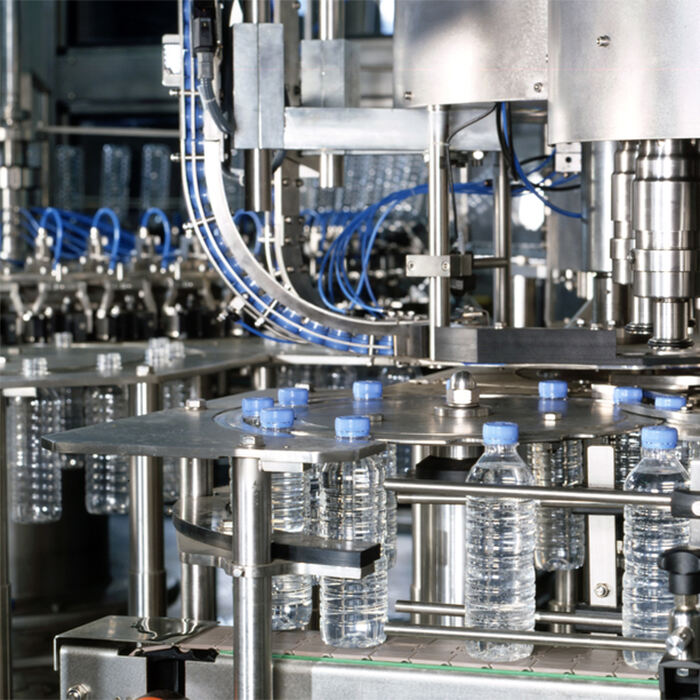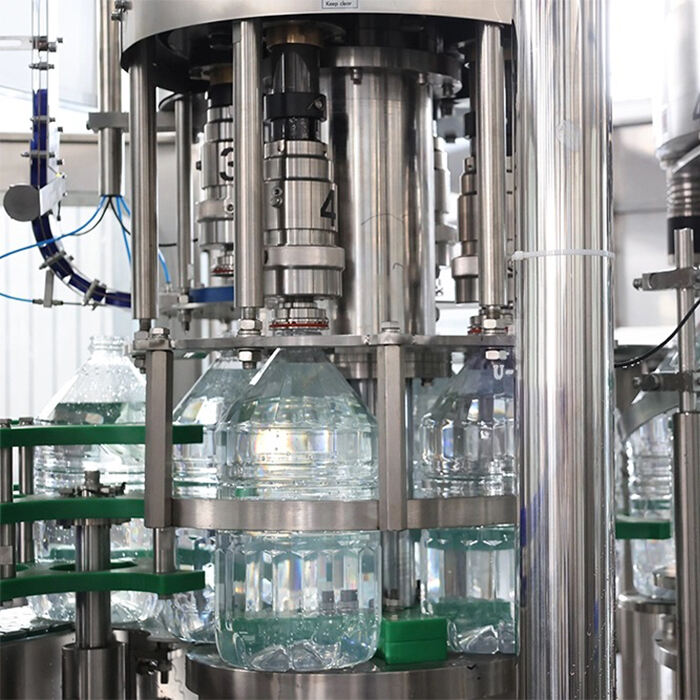The Evolution and Advantages of Modern Filling Machines: A Comprehensive Guide
Feb.28.2025
In today's fast-paced and highly competitive global market, the efficiency and precision of production processes are critical to the success of any manufacturing business. One of the most essential pieces of equipment in the packaging and bottling industry is the filling machine. Whether you are in the food and beverage sector, pharmaceuticals, cosmetics, or any other industry that requires liquid or semi-liquid packaging, a reliable and efficient filling machine is indispensable.
At our company, we specialize in providing high-quality mechanical solutions tailored to meet the diverse needs of our clients worldwide. Our filling machines are designed with innovation, precision, and reliability in mind, ensuring that our customers can achieve maximum productivity and efficiency in their operations. In this article, we will delve into the world of filling machines, exploring their evolution, key features, and the benefits they bring to modern manufacturing processes.
The Evolution of Filling Machines
Filling machines have come a long way since their inception. In the early days, manual filling processes were the norm, with workers using simple tools to pour liquids into containers. This method was not only time-consuming but also highly prone to errors and inconsistencies. As industrialization took hold, the demand for more efficient and accurate packaging solutions grew, leading to the development of the first mechanical filling machines.
Early Mechanical Filling Machines
The early mechanical filling machines were a significant improvement over manual methods. They used basic principles such as gravity and piston mechanisms to fill containers. However, these machines were still relatively slow and had limited capacity. They were also not very precise, often resulting in overfilling or underfilling of containers.
The Introduction of Automated Filling Machines
With the advent of automation technology, filling machines underwent a major transformation. Automated filling machines were introduced, which used advanced sensors, valves, and control systems to achieve higher accuracy and speed. These machines could fill containers at a much faster rate and with greater consistency, making them ideal for large-scale production.
Modern Filling Machines: Precision and Versatility
Today's filling machines are a testament to technological advancements. They are highly sophisticated pieces of equipment that combine precision engineering with advanced software and control systems. Modern filling machines are designed to handle a wide range of products, from thin liquids like water and oils to viscous substances like syrups and creams. They are also capable of filling various types of containers, including bottles, jars, cans, and pouches.

Key Features of Modern Filling Machines
Modern filling machines come with a host of features that make them highly efficient and reliable. Here are some of the key features that set them apart:
High Precision and Accuracy
One of the most significant advantages of modern filling machines is their ability to achieve high precision and accuracy. Advanced sensors and control systems ensure that each container is filled to the exact volume specified, reducing waste and ensuring product consistency. This level of precision is crucial in industries such as pharmaceuticals and cosmetics, where even small variations in product volume can affect quality and safety.
High-Speed Production
Another key feature of modern filling machines is their high-speed production capabilities. These machines are designed to operate at extremely fast rates, filling hundreds or even thousands of containers per hour. This high-speed operation is essential for meeting the demands of large-scale production and ensuring that products reach the market quickly.
Versatility and Flexibility
Modern filling machines are highly versatile and can be easily adapted to handle different types of products and containers. They are equipped with interchangeable parts and adjustable settings, allowing manufacturers to switch between different products and packaging formats with minimal downtime. This flexibility is particularly important for companies that produce a wide range of products or need to adapt to changing market demands.
User-Friendly Interface
To ensure ease of operation, modern filling machines come with user-friendly interfaces. These interfaces are typically equipped with touchscreens and intuitive controls, making it easy for operators to set up and monitor the filling process. Advanced software also provides real-time data and diagnostics, allowing operators to quickly identify and address any issues that may arise.
Safety and Compliance
Safety and compliance are critical considerations in the design of modern filling machines. These machines are equipped with advanced safety features such as emergency stop buttons, safety guards, and interlock systems to protect operators and ensure safe operation. They are also designed to comply with international standards and regulations, ensuring that products meet the highest quality and safety requirements.
The Benefits of Modern Filling Machines
The adoption of modern filling machines brings numerous benefits to manufacturing operations. Here are some of the key advantages:
Increased Productivity
By achieving high-speed production and reducing downtime, modern filling machines significantly increase overall productivity. Manufacturers can produce more products in less time, leading to higher output and improved profitability.
Improved Product Quality
The precision and accuracy of modern filling machines ensure consistent product quality. Each container is filled to the exact volume specified, reducing the risk of overfilling or underfilling. This consistency is crucial for maintaining product quality and customer satisfaction.
Cost Savings
While the initial investment in a modern filling machine may be higher than that of older models, the long-term cost savings are substantial. High-speed production reduces labor costs, and precise filling reduces material waste. Additionally, the reliability of modern machines reduces maintenance costs and downtime.
Enhanced Competitiveness
In today's competitive market, manufacturers need to differentiate themselves by offering high-quality products at competitive prices. Modern filling machines enable manufacturers to achieve both of these goals. By increasing productivity and improving product quality, manufacturers can enhance their competitiveness and gain a larger market share.
Environmental Sustainability
Modern filling machines are also designed with environmental sustainability in mind. Their precision filling capabilities reduce material waste, and their energy-efficient designs lower energy consumption. This makes them an ideal choice for companies looking to reduce their environmental footprint.
Applications of Filling Machines
Filling machines are used in a wide range of industries, each with its own unique requirements. Here are some of the most common applications:
Food and Beverage Industry
The food and beverage industry is one of the largest users of filling machines. These machines are used to fill bottles, cans, and pouches with products such as water, juice, soda, beer, wine, and sauces. The ability to handle a wide range of liquid viscosities and container types makes filling machines essential for this industry.
Pharmaceutical Industry
In the pharmaceutical industry, filling machines are used to fill bottles, vials, and ampoules with liquid medications, syrups, and other pharmaceutical products. Precision and accuracy are critical in this industry, as even small variations in product volume can affect the efficacy and safety of medications.
Cosmetics and Personal Care Industry
The cosmetics and personal care industry also relies heavily on filling machines. These machines are used to fill bottles, jars, and tubes with products such as creams, lotions, shampoos, and conditioners. The ability to handle viscous substances and ensure consistent product quality is essential for this industry.
Chemical and Industrial Sector
Filling machines are also used in the chemical and industrial sector to fill containers with various chemicals, oils, and lubricants. These machines must be designed to handle corrosive and hazardous materials, ensuring the safety of operators and the environment.
Choosing the Right Filling Machine
With so many types of filling machines available on the market, choosing the right one for your needs can be a daunting task. Here are some key factors to consider:
Type of Product
The type of product you are filling will determine the type of filling machine you need. For example, if you are filling thin liquids like water, a gravity filler or a volumetric filler may be suitable. If you are filling viscous substances like syrups or creams, a piston filler or a pump filler may be more appropriate.
Container Type
The type of container you are using will also influence your choice of filling machine. Some machines are designed specifically for bottles, while others can handle jars, cans, or pouches. Make sure the machine you choose is compatible with your container type.
Production Volume
Your production volume is another important consideration. If you have a high production volume, you will need a machine that can operate at high speeds and handle large quantities of product. For smaller production volumes, a more compact and lower-speed machine may be sufficient.
Budget
Your budget will also play a role in your decision. While modern filling machines offer numerous benefits, they can be expensive. Make sure to consider the long-term cost savings and return on investment when choosing a machine.
Support and Service
Finally, consider the support and service provided by the manufacturer. Look for a company that offers comprehensive after-sales support, including training, maintenance, and spare parts. This will ensure that your machine operates reliably and efficiently over its lifetime.

Conclusion
In conclusion, modern filling machines are essential tools for any manufacturing business looking to optimize their production processes. With their high precision, speed, versatility, and reliability, these machines offer numerous benefits, including increased productivity, improved product quality, cost savings, and enhanced competitiveness. At our company, we are committed to providing our customers with the highest quality filling machines, tailored to meet their specific needs. Whether you are in the food and beverage industry, pharmaceuticals, cosmetics, or any other sector, we have the solution that will help you achieve your production goals.
If you are considering investing in a filling machine, we encourage you to contact us for more information. Our team of experts will work with you to understand your needs and recommend the best solution for your business. Together, we can help you take your manufacturing operations to the next level and stay ahead in today's competitive market.

 EN
EN
 AR
AR
 BG
BG
 HR
HR
 CS
CS
 DA
DA
 NL
NL
 FI
FI
 FR
FR
 DE
DE
 EL
EL
 HI
HI
 IT
IT
 JA
JA
 KO
KO
 NO
NO
 PL
PL
 PT
PT
 RO
RO
 ES
ES
 SV
SV
 CA
CA
 TL
TL
 IW
IW
 ID
ID
 LV
LV
 LT
LT
 SR
SR
 SK
SK
 SL
SL
 VI
VI
 SQ
SQ
 HU
HU
 TH
TH
 TR
TR
 BE
BE
 LA
LA
 KK
KK


